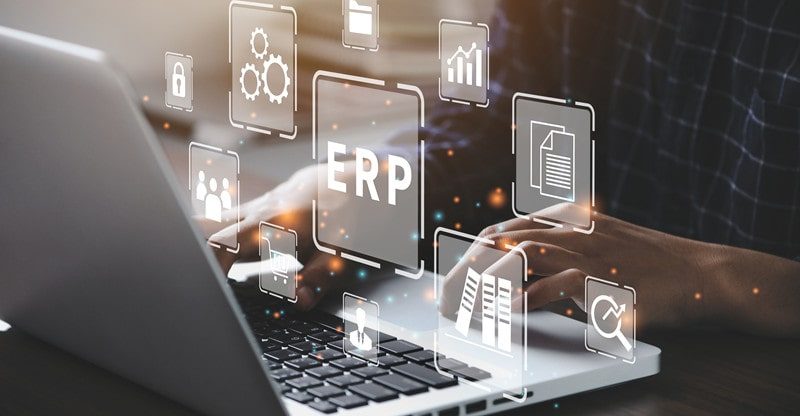ERP For Distribution And Wholesale Business
The ever-changing market requirements make running a distribution and wholesale business complex. Besides, there are various processes you need to manage, like inventory, supply chain, and orders. This makes it imperative to have a tool that helps streamline and automate processes. And that’s where distribution software systems come in.
Distribution ERP allows you to manage inventory, orders, and supply chain operations from one platform. This leads to improved profitability and customer satisfaction. Not sure how? Let’s understand what an ERP distribution management system is, its benefits, and how to choose the right one.
What is Wholesale Distribution ERP?
Wholesale Distribution ERP is an enterprise resource planning software solution for distribution businesses’ needs. It helps manage various processes, including inventory, order processing, and supply chain management. This allows you to streamline operations and improve efficiency.
One of the key benefits of wholesale distribution ERP is its ability to automate routine tasks. This includes order processing, inventory management, and supply chain tracking. A distribution software solution can reduce errors, improve accuracy, and save time by automating common tasks. As a result, you can focus more on growth and customer satisfaction.
For instance, FirstBit, the best ERP for a distribution business, has numerous modules to help you manage every aspect of your operations. The software has everything you need, from sales and purchase to accounting and approvals. Plus, it is a VAT-compliant system that makes it easier to comply with UAE VAT laws.
Besides, software for distribution companies helps them create in-depth accounting reports. This allows them to optimize their cash flow and increase profitability.
Benefits of ERP for Distribution Businesses
There are numerous benefits of using an ERP system for distribution businesses. Here are some of the key benefits:
- Improved inventory management: The right software for distribution businesses can help manage inventory levels more effectively. It does so by providing real-time visibility into stock levels and demand.
- Streamlined order processing: ERP can automate order processing tasks such as order entry, order fulfillment, and invoicing. This reduces errors, improves accuracy, and speeds up the order-to-cash cycle.
- Enhanced supply chain visibility: It gives real-time visibility into supply chain performance. This helps identify potential blockages and make adjustments.
- Increased efficiency and productivity: ERP software helps you reduce manual processes and improve productivity. It lets you automate routine tasks and provides advanced analytics to support decision-making.
- Scalability: Wholesale Distribution ERP can scale to meet the needs of growing businesses. To support your needs, you can add new users and modules at nominal costs.
- Enhanced customer service: ERP systems allow you to manage customer data and interactions. This helps build stronger relationships and increase customer loyalty.
- Better forecasting and planning: ERP systems offer powerful forecasting and planning tools. It helps make more accurate predictions about customer demand and plans accordingly. As a result, you can prevent stockouts or overstocking, leading to reduced inventory costs.
Choosing the Right ERP for Distribution Companies
Selecting the right software for distribution companies is important for maximizing value for money. Here are some things to consider when choosing an ERP solution:
- Features: Look for an ERP solution built for distribution businesses. It should support inventory management, order processing, supply chain management, and demand planning.
- Scalability: Ensure the tool can grow with your business. This means it should be able to handle more users, transactions, and data.
- Integration: Your ERP solution should work well with other systems, like your e-commerce platform, CRM, and accounting software. This will show you everything you need to know about your business in one place.
- User-friendly interface: You’d not want to spend hours training your employees to do basic tasks. Thus, choose an ERP with an easy-to-use interface that makes it simple for your staff to learn and use the system.
- Mobile access: Wholesale and distribution businesses often require employees to work outside the office. Thus, having mobile access is critical to ensuring they get the necessary information to do their jobs.
- Reporting and analytics: Look for an ERP system that offers comprehensive reporting and analytics features. This will allow you to analyze data and make informed business decisions.
- Vendor support: Check the vendor’s history of customer support. Look how quickly they can provide technical help.
- Customization: Consider choosing an ERP system that can be customized to meet your business requirements and processes.
- Data security: Your ERP should offer robust data security features, such as encryption, backup and disaster recovery, and user access controls.
Types of ERP Distribution Management Solutions
There are different types of distribution software systems in the market. Choose the one that suits your business requirements.
- Standalone ERP systems focus exclusively on distribution management functions. They include features like inventory control, order management, and shipping.
- Industry-specific ERP systems are built for specific industries, like distribution and wholesale or construction businesses. They offer features and functionality tailored to the unique needs of these industries. For instance, FirstBit ERP is designed to help companies navigate the distribution industry’s complexities.
- Cloud-based ERP systems are hosted on the cloud and accessed through a web browser. They offer a range of benefits, including scalability, flexibility, and cost-effectiveness.
- On-premise ERP systems are installed on the company’s servers and accessed through a local network. They offer greater control and security but may require a more upfront investment.
- Open-source ERP systems are free to use and can be customized to meet the specific needs of a distribution company. However, they may require more technical expertise to set up and maintain.
Note: The right ERP distribution management system for your business depends on your needs. For instance, cloud-based solutions are a good choice if you’re looking for a cost-effective solution. However, you can opt for on-premise systems if you want more control. However, it is recommended to go for industry-specific solutions. They have built-in features to address your industry’s pain points.
Wrapping Up
An ERP system is crucial for the success of distribution and wholesale businesses. It offers a range of benefits, including improved efficiency, cost savings, and increased profitability. However, choosing the right ERP system that aligns with your business requirements and goals is important.



